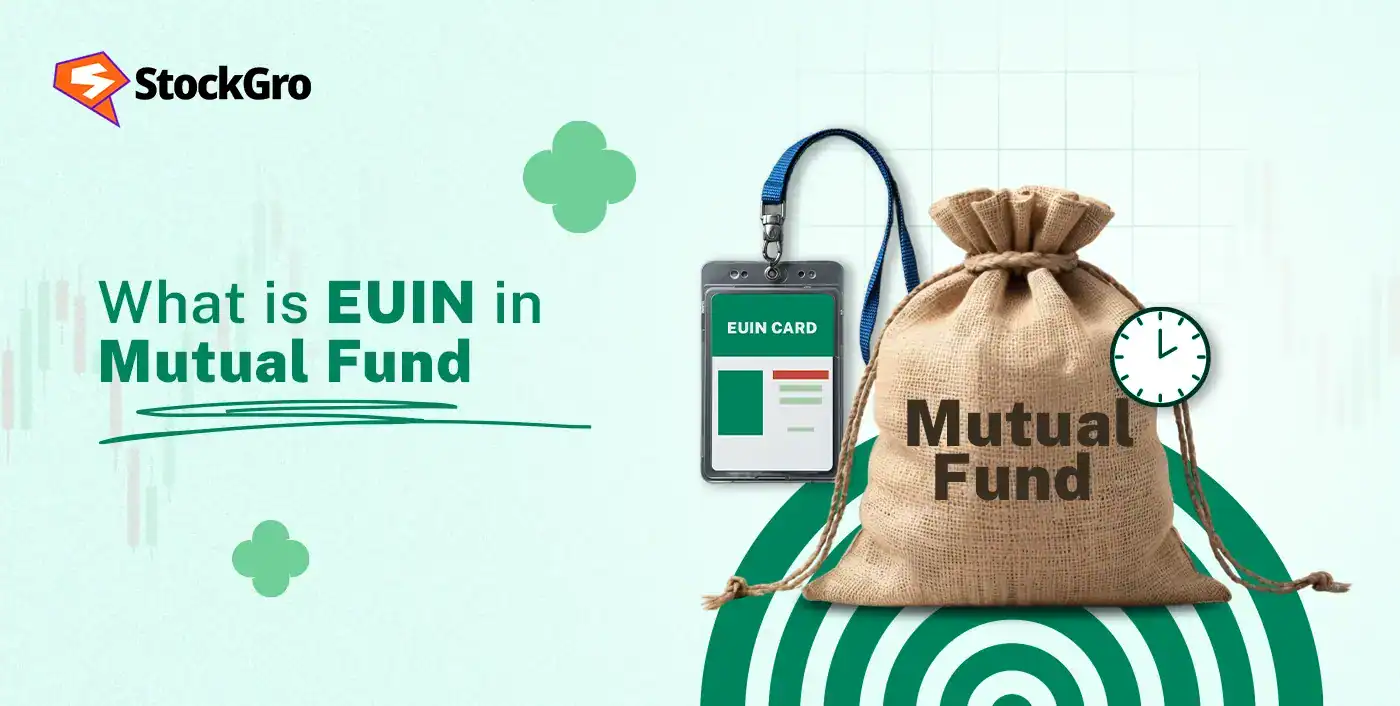
Trying to revisit an old mutual fund recommendation often only to find out the relationship manager has changed, the branch relocated, and no one knows who was your relationship manager ? That kind of confusion makes it difficult to follow up, raise complaints, or course-corrections.
This is exactly what the EUIN number in mutual funds solves, it builds a clear audit trail, brings accountability, and keeps your transactions free from ambiguity. In this blog, we’ll learn what is EUIN number in mutual fund, how it works and more in this blog.
What Is EUIN Number in Mutual Fund?
An EUIN, or Employee Unique Identification Number, is a code assigned to individual mutual fund distributors or their staff. It ensures that investor transactions are linked to the person providing advice or assistance. By using the EUIN in mutual fund applications, accountability is maintained, helping regulators track who guided the investment decision.
The EUIN is a unique code introduced by the Association of Mutual Funds in India (AMFI). As per regulatory guidelines, this number is mandatory for employees, relationship managers, or sales staff engaged in selling or advising on mutual fund products. EUIN ensures transparency by recording the identity of the advisor or distributor’s representative involved in a mutual fund transaction, making it easier to track responsibility in case of disputes or mis-selling complaints.
Importance of EUIN in Mutual Fund Transactions
The importance of EUIN in mutual fund transactions can be seen in the following ways:
- Traceability of advice even after exits: EUIN ensures that transactions remain linked to the original advisor, even if they leave the ARN holder or sub-broker. This accountability discourages reckless selling practices.
- Transparency through complete documentation: Application forms capture ARN code, Sub-Broker ARN code, EUIN code, and Sub-Broker code, creating a full record of the advisory process for both investors and regulators.
- Authenticity in sales interactions: By linking every transaction to an identifiable employee, EUIN gives investors confidence that advice is backed by a verified representative.
- Distinction between guided and self-driven choices: EUIN clarifies whether investors acted independently or based on distributor advice, reducing ambiguity in the nature of the transaction.
- Consistent audit trail across employers: Since EUIN stays active even if an advisor changes firms, regulators and fund houses can monitor practices effectively across the industry.
- Ensuring proper commission payouts: The EUIN is so important that if it’s missing from an application, the distributor has only 30 days to provide it or submit a declaration from the investor stating it was left blank intentionally. Failure to complete this “EUIN remediation” results in the permanent forfeiture of commission for that transaction.
Who Issues EUIN and Who Needs It?
The EUIN system is overseen by the Association of Mutual Funds in India (AMFI), which allocates codes to distributor employees after they register and pass required certifications.
The registration process, handled by CAMS on behalf of AMFI, is now entirely online and paperless, requiring mandatory PAN and Aadhaar for ‘Know Your Distributor’ (KYD) verification. This online Aadhaar-based system has replaced the older requirement for in-person biometrics.
The process involves:
- NISM certification: The employee must pass the NISM-Series-V-A: Mutual Fund Distributors Certification Examination.
- Online application: The ARN Holder (distributor firm) initiates the application on behalf of the employee.
- Fee payment: A non-refundable processing fee of ₹1,500 plus applicable GST must be paid online.
Upon verification, AMFI issues an EUIN card. A key feature of the EUIN is its permanence. Linked to an individual’s PAN, the number is non-transferable and stays with them for their entire career, even if they switch employers. When changing jobs, a simple re-mapping process is done to link the existing EUIN to the ARN of the new employer.
Those who typically need an EUIN include:
- Employees of mutual fund distributors who interact with clients.
- Relationship managers or advisors of banks distributing mutual funds.
- Agents or staff of non-bank distributors registered with AMFI.
Investors themselves do not need an EUIN; they only need to record it in their application forms when acting on advice, or mark the “execution only” box if no recommendation is given. This process ensures transparency about whether a mutual fund purchase was based on advice or self-decision.
Role of EUIN in Preventing Mis-selling
The specific roles of EUIN in reducing mis-selling within mutual fund transactions are as follows:
- Verifying accountability of distributor employees: EUIN assigns responsibility at the individual level, making it harder for sales personnel to provide misleading advice without being identified.
- Discouraging unsuitable product pushing: Since each recommendation is tagged to a unique employee, distributors are less likely to push products that do not align with investor profiles.
- Strengthening regulatory enforcement: EUIN gives regulators a precise reference point for investigations, enabling them to take corrective measures against individuals instead of holding only the distributor entity liable.
- Reinforcing ethical sales culture: With EUIN attached to every advised transaction, employees are encouraged to prioritize compliance and fair practices, reducing incentives for misrepresentation.
- Supporting investor redressal mechanisms: In case of complaints, EUIN provides clarity on who offered the advice, ensuring that grievances are directed to the right individual and resolved more effectively.
How to Find/Verify EUIN Number
The EUIN is essential in every mutual fund transaction, and investors can verify it through a few simple steps:
- Direct confirmation from advisor: Whether you invest through a bank, broker, or mutual fund distributor, the advisor must provide their EUIN on request. It is part of their compliance responsibility to share this code at the time of transaction.
- Check official documents: The EUIN is usually printed on application forms, welcome emails or kits, transaction statements, and even digital confirmations sent by platforms or distributors. Keeping copies of these ensures you have proof of the code linked to your investment.
- Cross-check on ID cards: Many distributor employees carry official ID cards that mention the EUIN, validity date, and name, making it easy to verify.
- Secure personal records: Recording the EUIN used in your transaction provides traceability in case of disputes or clarifications later.
Difference Between ARN and EUIN
In mutual funds, both ARN and EUIN are unique identifiers, but they serve different purposes; here’s how they differ:
| Aspect | ARN (AMFI registration number) | EUIN (employee unique identification number) |
| Identification level | Code issued to a distributor, broker, or intermediary registered with AMFI | Code issued to individual employees/relationship managers of the distributor |
| Main function | Tracks the distributor or entity handling mutual fund transactions | Identifies the specific employee who advised the investor |
| Coverage | Applies at organization or distributor level | Applies at individual advisor level |
| Continuity | Remains with the distributor entity | Stays with the employee, even if they switch organizations |
| Accountability focus | Ensures distributor is AMFI-registered | Ensures accountability of the employee giving advice |
Note for individual distributors: It’s important to know that individual distributors who register for an ARN are automatically issued an EUIN by default, without needing a separate application or fee.
Conclusion
The EUIN number answers the long-standing question of what is EUIN number in mutual fund by creating a clear identity trail for every piece of advice. It follows the advisor even across employers, ensuring consistency in accountability. With each transaction linked to a unique code, investors gain transparency while regulators gain a reliable tool to monitor, investigate, and uphold fairness in mutual fund dealings.
FAQs
No, EUIN (Employee Unique Identification Number) is mandatory only for transactions done through distributors or agents to track and prevent mis-selling. It does not apply to direct transactions or those made without intermediaries.
The Association of Mutual Funds in India (AMFI) issues the EUIN to individuals such as employees, relationship managers, or sales agents working under mutual fund distributors. It uniquely identifies the person advising or facilitating the mutual fund transaction.
EUIN ensures transparency and accountability by linking each transaction to a specific individual distributor or agent. This helps protect investors against mis-selling and unethical practices, allowing regulators to trace and address malpractice effectively.
Investors can verify a distributor’s EUIN by requesting it directly from their advisor, checking mutual fund documents or ID cards showing the EUIN, and keeping personal records. AMFI also offers limited verification through its website’s distributor corner using PAN or application details.
ARN (AMFI Registration Number) identifies the mutual fund distributor firm, while EUIN (Employee Unique Identification Number) is assigned to individual employees or agents of that distributor. ARN tracks the firm, EUIN tracks the specific person involved in the transaction.

